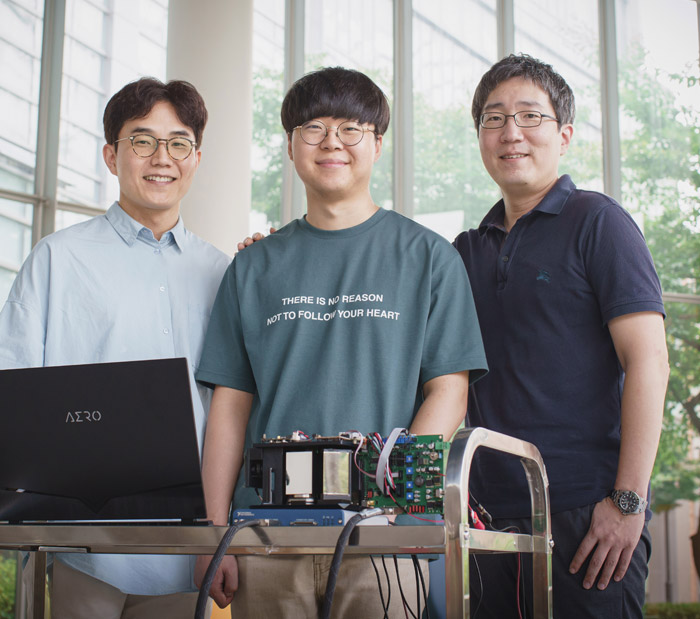Research Stories
Development of the nation’s first CMOS LiDAR Sensor System-on-Chip
Selected as a Research Highlight at VLSI Conference 2020
Semiconductor Systems Engineering
Prof.
CHOI, JAE HYUK
Prof. Jung-Hoon Chun·Researcher Hyeong-Seok Seo
Prof. JaeHyuk Choi and Prof. Jung-Hoon Chun in the Department of Semiconductor Systems Engineering at SKKU have successfully developed the nation’s first CMOS Light Detection and Ranging (LiDAR) sensor for autonomous vehicles. The research paper was presented at the VLSI symposia, the top-tier conference on semiconductor circuits and technologies.
Founded in 1981, VLSI symposia has a 40-year history this year and is one of the most prestigious conferences. It is also well known for selecting papers through a rigorous review process and for leading companies such as Intel and Samsung to present the latest technology competitively.
A LiDAR sensor measuring a distance of objects as well as 2-dimensional shape is an essential component for object/environment detection and recognition in autonomous vehicles, robots, and drones. Even though several LiDAR sensors were already commercialized, these products have the large form factor and high price owing to the assembly of many discrete IC components. The SKKU’s LiDAR sensor that is a single semiconductor chip with 6 x 5 mm2 size offers mass production with low-cost semiconductor (CMOS) technology.
Several CMOS LiDAR sensors were already presented by overseas companies and research institutes such as Toshiba, Toyota, and EPFL. SKKU developed the first CMOS LiDAR sensor in Korea. More importantly, SKKU addressed two critical problems of inter-LiDAR interference between multiple vehicles and performance degradation according to weather conditions. SKKU newly developed an interference filter and a multi-event histogramming time-to-digital converter to provide reliable detection up to 48m range in real road applications where many vehicles run simultaneously. In collaboration with domestic companies, SOS Lab and Samsung Electronics, our research team successfully developed prototype sensor chips and outperformed existing LiDAR sensors.
SKKU presented the paper at the VLSI symposia's Image Sensor and Imaging Techniques session in June 2020. A total of 5 papers presented in the session are mainly published by the world's top companies such as Samsung and Toshiba. Additionally, SKKU is the only domestic university that presented one of the five papers.
※Paper: “A 36-channel SPAD-integrated scanning LiDAR sensor with multi-event histogramming TDC and embedded interference filter”, Symposia on VLSI Circuits, 2020.
※Authors: Hyeongseok Seo (1st author, dept. of electrical and computer engineering, SKKU), Jaehyuk Choi (corresponding author, dept. of semiconductor systems engineering, SKKU), Jung-Hoon Chun (co-author, dept. of semiconductor systems engineering, SKKU), Heesun Yoon·Dongkyu Kim (co-authors, SOS Lab), Jungwoo Kim (co-authors, Samsung Electronics), Seong-Jin Kim (co-authors, dept. of electrical and computer engineering, UNIST)

